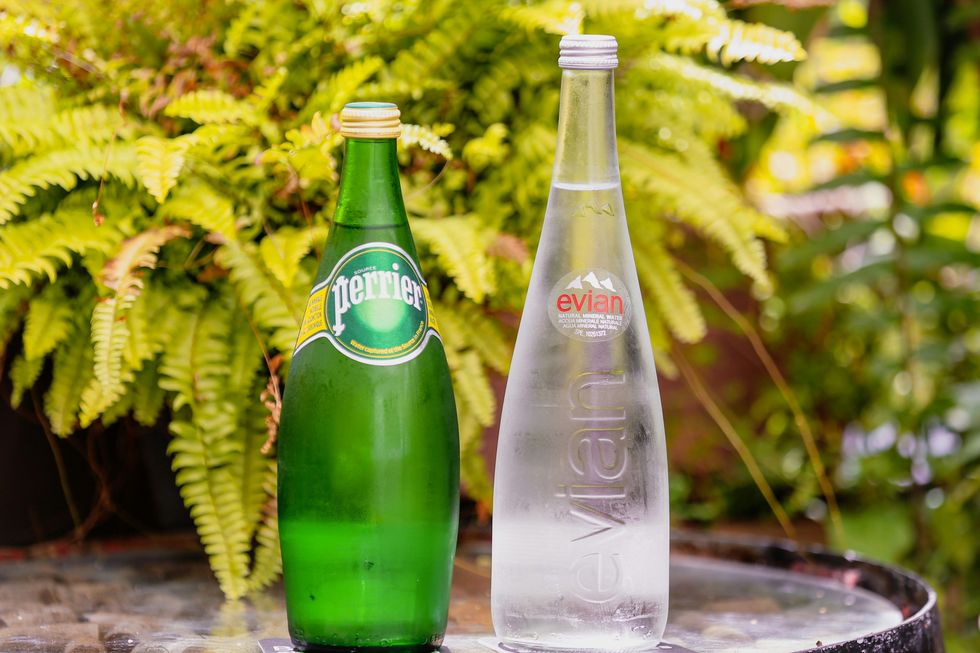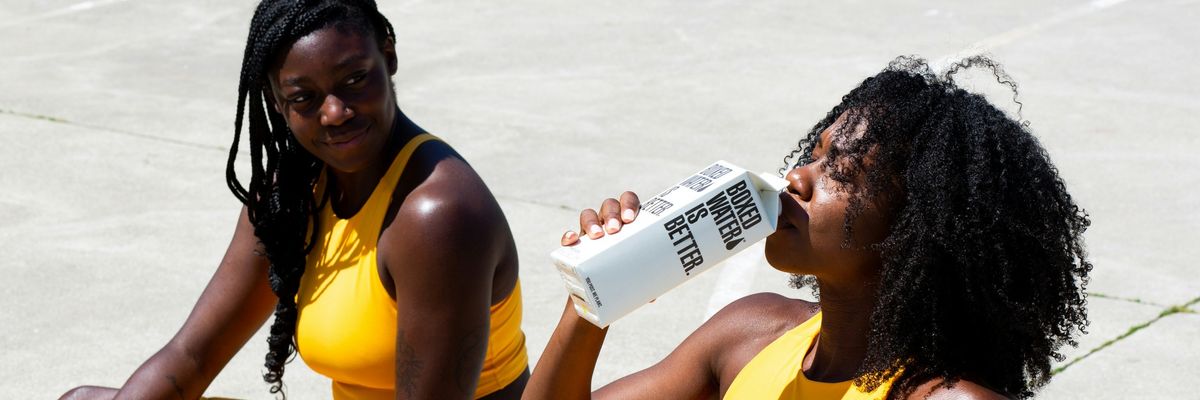Estranged From Your Family? This Will Get You Through The Holidays.

I'm pretty much assuming that we all can agree on the fact that this isn't the most pleasant topic on the planet. But when I factor in the fact that I know what it's like to choose to remove myself from toxic family members and then I add to that, an article I read that said between 12-17 percent of folks are estranged from at least one family member (personally, based on a lot of stories I've been told, that stat seems really low to be honest with you), I knew that it would be necessary to get this done; especially during a year when a lot of us have spent more time away from loved ones, just with the pandemic alone.
If you're like me and holidays aren't really your thing anyway, figuring out how to make it through the next several weeks may not be that big of a deal. But if Thanksgiving, Christmas and New Year's Eve are typically the time when you see your family the most and yet, for whatever the reason, this year, you're not speaking to some or all of your folks, take a deep breath, get yourself a warm cup of tea or cocoa and let's figure out how you can get to January 1, 2021 with your heart as intact as possible, OK?
Remember Why the Boundaries Exist in the First Place
I say it often because it's the truth—boundaries are limits and yes, limits oftentimes have to be applied to family members, just like anyone else; shoot, sometimes even more. It's clear that many of us either weren't taught what boundaries are as well as we should've been or we had people in our lives who constantly violated our boundaries, whether that's physically, emotionally, mentally or even spiritually (you know, people who use religion to justify all of their foolish, destructive and erratic behavior). And so, sometimes, a season of estrangement is so we can get away from the people who clearly have a lot to learn in the area of boundaries so that we can establish the ones that are best for us and the kind of life that we choose to live.
While it's perfectly normal (and understandable) to miss your family around this time of year, it's important to make sure that you do your best to separate your nostalgia and sentimentality from the truth, facts, and reality of why you are maintaining a distance from them to begin with. Make no mistake about it—if you're currently estranged because say, you've got family members who are controlling or manipulative, they will definitely try and use that to their advantage between Thanksgiving and New Year's Day. That said, if you choose to engage, let it be because you're ready, not simply because it's the holiday season because, at the end of the day, a holiday is just a day and you'll still have to pick up the pieces of whatever "extra else" your family brought into your life, once the festivities are over. Boundaries are designed to protect us. The violation of boundaries is abusive. Set boundaries first. Honor them. Then make whatever other decisions are best for you, based on that.
Be Honest with Yourself About What You’re Currently Feeling
As I've done a lot of my own healing as it relates to toxic family members, if I had to put together a top five list of things that made me be like, "Yeah, we need some distance", something that would probably go into the third or fourth slot, is the fact that I was never really given the space to feel what I wanted and needed to feel when it came to the abuse that I endured or the abusers who caused it. I was always cut off or emotionally manipulated and told that whatever thoughts or emotions I had weren't "pleasing to God" or valid to them. THAT. IS. POISON. And when you're constantly around people like that, it can cause you to have a bit of an identity crisis as you try and figure out who the heck you are and what your real feelings are vs. what they tried to guilt you into feeling—or not feeling.
While estrangement can be hard, if there is a bona fide benefit to it, it's that you now have the space to figure out how you feel when it comes to why you pulled yourself away, what you would need in order to reconcile and how you feel in this very moment. It's important to factor all of this in because between Hallmark movies, holiday music and your friends constantly bringing their own families up, it can be easy to question if you should totally forget your boundaries and at least act like you and your family are close; healthy even.
Please try and avoid doing that. I know a lot of media says that the holidays are a time for burying the hatchet 'n all, yet the reality is, if you didn't feel great about connecting back in June, December 25 shouldn't automatically change anything. Honor your feelings and make decisions from there because, remember—if your family had done the same, there would be no need to read this article…right?
Watch Your Triggers
On the heels of what I just said, there's a really good chance that someone from your family is gonna hit you up, saying that it's in the spirit of the holiday season. No one can really fault them for that; however, if you do choose to answer their DM, email, text, or phone call, just make sure that you know what your triggers are beforehand. For instance, something that I've learned is a sho 'nuf trigger for me are people who claim that they are reaching out to apologize, only to really call to justify foul behavior, hoping that by the time they are done, I will excuse what they've done—perhaps even feel sorry for them for hurting me in the first place (a true narcissism trait, by the way). For years, I would fall for that BS, only to hang up and feel like they opened up my wound all over again.
Why? Because when you've been harmed by someone, it's important for them to validate that pain; they can do that by taking full ownership for their actions. That said, whenever folks find a way to skirt around this fact, all they're doing is injuring you more. And when you keep getting hurt, either it makes you angry or turns you numb. So yeah, I had to stop dealing with the ones who did that to me because they've been like that since, shoot...for as long as I can remember. This means that they've been wounding me and causing me grief for as long as I can remember as well. I had to get some space so that the wounds could heal. Fully.
I don't know what sets you off and by no means am I saying that it's a given that once you get to the root of your triggers that you also shouldn't speak or deal with whoever triggers you. What I am saying is unsafe/toxic people seem to live to push triggers, so the way to deal with them is to know yours and then set up safeguards. If your controlling mama makes you a basket case with her religious deflecting, accept that. If your sister drives you up the wall with her constantly asking for things without ever offering something in return, own that. If you've got some other family member who puts you in the foulest of moods, just 10 minutes into a conversation, admit that too. Then make two decisions. First, decide if there is a way to deactivate that trigger within yourself (because expecting them to not trigger you is, 8 times out of 10, gonna disappoint you every time). Second, if you can't deactivate it, be real with yourself about whether total avoidance is still the best route to take. After the holidays, you've still got a life to live. It would be a shame to spend months into next year trying to heal from a few short weeks of the holiday season and that family of yours, simply because you let them trigger you in a way that you know you're not fully prepared to handle. Yet.
Create Your Own Traditions
While I was growing up, my mother was pretty big on Christmas. I remember getting a fresh evergreen Christmas tree, stringing popcorn, watching The Grinch Who Stole Christmas and listening to gospel Christmas music while she baked. It was also pretty common for folks to come over as she made us—yes, made us—go caroling in the neighborhood. Christmas was cool. As Christmas goes, I guess. However, as an adult, I don't observe Christmas or really any holiday. No, I'm not a Jehovah's Witness; I'm just the kind of person who, once I know the backstory on something and decide I don't want to be a part of it, I tend to dip out. Anyway, that's so not the point. Once I started fading out of Christmas, for years, I would get pushback. And if there's a truth about adulthood, it's that you now have the complete freedom to live your life as you see fit, without the need for anyone's permission or approval.
While being estranged means that you won't be a part of your family's holiday-themed customs, never forget that the flip to that is you can happily create some of your own. So yeah, take this time and ask yourself what you do and don't like about the holiday season. Then make plans for observing them—or not observing them—just as you see fit. Finally.
Spend Time with Some of Your “Love Family”
Friendships have layers and levels. I will be the very first person to agree with that resolve. I liken it to Christ and his 12 disciples. One was a devil (it's Scriptural—John 6:70). Eight were his homies. And then there was Peter, James and John—the three he asked to pray with him as he was preparing to make the ultimate sacrifice (Matthew 26, John 3:16); those were his top-tier, inner circle friends—the ones he probably saw as being like brothers to him. I've got people like that in my life. Individuals who are emotionally safe, who love me like we're blood and who have my back no matter what. While the family I was born into is my "blood family", I choose to call my dearest friends my "love family".
Even if you aren't close to and/or engaging your blood family this year, if you've got people in your world who you consider to be your own love family, I am willing to be my next paycheck that they will be more than willing to embrace you with open arms and a seat at their dinner table (so long as you show no signs of sickness and bring your mask). And because you are so at peace with them, you can easily avoid all of the discomfort and drama that might arise if you try and force yourself to be in an environment where you don't really want to be…just because it's "the holidays". Trust me, love family can be a wonderful alternative to blood family, if you want to be around people yet you want to not risk conflict and issues in the process.
Understand What True Reconciliation Requires
I can't tell you, just how many Christmas movies I've seen over the course of my lifetime, where the overall message is it's this time of year when all faults need to be wiped clean, so that we can start the year anew. There's A LOT I could say to that, yet I'll leave it where I typically do when I just wanna give the Reader's Digest version of my thoughts on the matter. If you feel like you want to connect back with the family who you're not currently interacting with, do that. Just make sure that you know who and what you're dealing with and that you are clear on what reconciliation is all about.
What reconciliation is not is what a lot of republicans are trying to shove down democrats' throats right through here; it's not about enduring constant abuse and then having the burden be placed on you, the one who had to endure it all, to set things right. While yes, restoring a broken relationship does require some forgiving on the "victim's" part, don't let anyone make you feel bad for expecting some full-on repenting on the "victimizer's" part as well. Repenting requires taking responsibility. Repentance requires wanting to make amends. Repentance requires seeking what you need in order for the estrangement to cease. Repentance also requires humility.
So, if a family member chooses to reach out, stating that reconciliation is what they truly desire, keep in mind what it looks like. Don't let anyone make you feel like being flippant or dismissive is good enough. It's not. Not by a long shot.
Again, I know this wasn't the warm-and-cozy-wrapped-up-in-a-big-red-bow kind of message. Still, I hope it offered up a little bit of clarity and confirmation for those who may not be with their family this year. Being estranged doesn't make you a bad person. It makes you someone who simply wants better for yourself. Feel good about that. Even if that means experiencing a different kind of holiday season this year. One that brings peace and goodwill your way—just differently.
Join our xoTribe, an exclusive community dedicated to YOU and your stories and all things xoNecole. Be a part of a growing community of women from all over the world who come together to uplift, inspire, and inform each other on all things related to the glow up.
Featured image by Unsplash
This Is How To Keep 'Holiday Season Stress' From Infecting Your Relationship
Hmph. Maybe it’s just me, but it seems like there is something really weird happening in the fall season air (because winter doesn’t officially begin until December 21) that cuddle season is in full swing while break-up season is as well. In fact, did you know that break-ups are so popular during the holiday season that December 11 is deemed Break-Up Day?
The reasons why relationships shift around this time vary; however, I did both roll my eyes and chuckle when I read that a very popular one is because it’s an easy way to get out of getting one’s significant other a Christmas present. SMDH.
Anyway, I personally think that the less shallow folks out here may contemplate calling things “quits” or they at least distance themselves a bit from their partner (and what I’m referring to is serious relationships) due to all of the stress and strain that oftentimes comes with the holidays whether it be financial, familial, due to their tight schedules or something else.
Listen, I would hate for you and your man to miss the fun and happiness of experiencing this time of year, all because you are so overwhelmed or irritated that you can’t really enjoy it. That’s why I have a few practical tips for how to avoid allowing the typical holiday season stress from INFECTING your relationship.
Manage Your Expectations
 Giphy
GiphyUnmanaged expectations. If there is a main reason why the holiday season tends to be so stress-filled for so many people, I’d bet good money that this is the cause. And when you’re in a long-term relationship, expectations can manifest themselves in all sorts of cryptic and/or unexpected ways. You might have relatives who assume that you are going to be with them for Thanksgiving or Christmas when you have other plans in mind. You might be thinking that you are going to spend one amount for presents while your man is thinking something totally different. When it comes to scheduling, your signals may be crossed.
And you know what? To all of these scenarios, this is where clear and consistent communication come in. Don’t assume anything. Don’t dictate anything either. From now until New Year’s, mutually decide to check in once a week, just to make sure that you are both on the same page as it relates to the holidays and what you both are thinking will come along with it. The less blindsided you both feel, the less stressed out you will be. Trust me on this.
Set (and Keep) a Budget
 Giphy
GiphyOkay, so I read that last year, 36 percent of Americans incurred some type of holiday-related debt. Hmph. Last year, there was still some sense of normalcy in this country, chile, so I can only imagine what finances are gonna look like over the next several weeks. That said, since I don’t know a lot of people who don’t find being broke stressful, make sure that you and your bae set a budget and then stick to it this year — no ifs, ands or buts.
Because really, y’all — it doesn’t make sense to deplete savings and/or max out credit cards for a few days of giggles only to be damn near losing your mind because you don’t know how to make ends meet come Dr. Martin Luther King, Jr. Day.
And by the way, this tip doesn’t just speak to things like food and gifts; I also mean travel. If it doesn’t make a ton of sense (or cents) to be all over the place this year — DON’T BE.
Keep Matthew 5:37 at the Forefront
 Giphy
GiphyIf off the top of your head, you don’t know what Matthew 5:37 says, no worries, here ya go: “But let your ‘Yes’ be ‘Yes,’ and your ‘No,’ ‘No.’ For whatever is more than these is from the evil one.” That verse right there? Oh, it’s a boundaries lifesaver! I say that because do you see “maybe” or “I’ll think about it” in there? Nope. LOL. It says that you should tell people “yes” or “no” and leave it at that — and that complements Anne Lamott’s quote, “’No’ is a complete sentence” impeccably well. Yeah, you’ve got to remember that anything beyond a yes or no to a request is privileged information; you don’t owe anyone details or an explanation.
Besides, if you are really honest with yourself, when someone asks you something and you give a “Umm, let me think about it” kind of reply, more times than not, you already know what your answer is going to be — so why not let you both off of the hook? Give your response. Commit to that. And let everyone (including yourself) get on with their lives and schedules.
I promise you that when it comes to those holiday parties, you are pissing more folks off by not RSVP’ing or doing so and not showing up than just saying, “Thank you but not this year” off the rip.
Remember That Your Personal Space Is Privilege Not a Right
 Giphy
GiphyA friend of mine recently bought a new house and invited me over to come see it. He’s a single man with no children, so as I was taking in all of the space that he had, especially as I walked through his finished basement, I joked about relatives coming to live with him. “Hell no” and “absolutely not” were pretty much his immediate responses as he went on to say that some folks even had the nerve to be offended when he told them that he had no intentions on taking DNA in.
Ain’t it wild how people think that your stuff is their right? And yes, that brings me to my next point. Your home is your sanctuary space. If you want to host folks this year — cool. If not, ALSO COOL. Please don’t let folks (family included) guilt you into how they want you to act or even into what they would do if the shoe was on the other foot. You are not them — and as one of my favorite quotes states, “If two people were exactly alike, one of them would be unnecessary.” (A man by the name Larry Dixon said that.)
Hell, my friends? They know that I am good for sending them random things that they need or even want all throughout the year. Coming over to hang out at my pace, though. Uh-uh. Chalk it up to being a card-carrying member of the ambivert club yet I like keeping my living space personal — and I sleep like a baby, each and every night, for feeling that way.
Always remember that your space, your time, your resources, your energy and shoot, yourself period (including your relationship), are all things that are your own. You get to choose how, when and why you want to share them. The holiday season is certainly no exception.
Cultivate Some “You Two Only” Traditions
 Giphy
GiphyIt’s not uncommon for some couples to hit me up after the holiday season to “detox.” Sometimes it’s due to the financial drama (and sometimes trauma) that they experienced. Sometimes it’s because they allowed their relatives (especially in-laws) to get more into their personal business than they should’ve. More than anything, though, it tends to be because they didn’t get enough quality time together and so ended up feeling “disconnected.”
Please don’t let that happen. Listen, I’m not even a holidays kind of woman and yet, I will absolutely sit myself down with some hot chocolate and chocolate chip cookies to enjoy a Hallmark holiday film or two. Aside from the fact that most of them are lighthearted and sweet, I also like that they usually focus on couples loving on each other amidst all of the holiday beauty and ambiance — which is something that all couples should set aside some time to do.
Maybe it’s a vacation. Maybe it’s a staycation. Or maybe it’s my personal favorite, A SEXCATION. Whether it’s for a few days, the weekend or even overnight — don’t you let the holidays go by without setting aside time for you and your man to celebrate one another. Don’t you dare (check out “Are You Ready To Have Some Very Merry 'Christmas Sex'?”).
GET. SOME. REST.
 Giphy
GiphyI once read that 8 out of 10 people get stressed out over the holidays and 3 out of 10 lose sleep during to it — and when you’re stress-filled and sleep-deprived, that can absolutely lead to hypersensitivity, making mountains out of molehills and even not being in the mood for sex.
Your relationship can’t afford to go through any of this, so definitely make sure to prioritize rest. I don’t care how unrealistic it might seem during this time, sleep should never be seen as a luxury; it will always and forever be a great necessity.
That said, try to get no less than six hours of shut-eye in (check out “6 Fascinating Ways Sex And Sleep Definitely Go Hand In Hand”) and even ask your bae to take a nap with you sometimes (check out “Wanna Have Some Next-Level Sex? Take A Nap, Sis.”). Not only will sleep help to restore your mind, body and spirit but, when it’s with your partner, it’s an act of intimacy that can make you both feel super connected, even in the midst of what might feel like chaos.
___
Holiday season stress is real. Still, never give it the permission or power to throw your relationship off. Put you and your man first and let the holidays be what they are gonna be, chile.
Let’s make things inbox official! Sign up for the xoNecole newsletter for love, wellness, career, and exclusive content delivered straight to your inbox.
Featured image by Shutterstock
I wish I enjoyed drinking plain ole’ water. I don’t, though, and, at this point, I doubt that I ever will. It’s not something that I’m proud of or anything, but like I’ve said in other articles on this platform, to me, water is so damn boring; it’s literally like drinking “wet air.”
That doesn’t mean I don’t accept that it’s a “necessary evil” being that we all are made up of so much water and being dehydrated (which is something that a lot of us are) can cause so many health-related issues, including blurred vision, muscle cramps, dried skin, fatigue and even moodiness.
That’s why, over the years, I’ve been intentional about figuring out ways to get more agua into my body without feeling like it’s a chore or something to dread. And now, I want to pass some of those hacks on to you, just in case you happen to totally relate to where I am coming from.
If something that you want to do more of right through here is get extra H2O into your system, here are 10 tips that can absolutely help to make that possible.

Unsplash
1. Invest in a Fun Water Bottle
There’s a far greater chance that you are going to drink water if you have a water bottle around you. So, cop yourself a cute one — one that will help you to stay motivated. A tumbler that I purchased some time back, just because I thought it was cute as hell, simply says, “Make Better Coochie Decisions” (amen?-LOL). Honestly, that doesn’t just have to apply to sex but how you treat your vagina overall — and that includes making sure that “she” has all of the fluids that she needs.
2. Try Some Sparkling Water or Mineral Water
At this point, I should take stock in Waterloo. It currently is my favorite kind of sparkling water and it has definitely made getting more water into my system easier to do. That’s because I will add some limes to it or a bit of fruit juice to it and that makes drinking water less “meh” for me. Another type of water that has bubbles in it is sparkling mineral water; it can also be beneficial since it contains magnesium, potassium and calcium.

Unsplash
3. Go Halfsies with Your Other Drinks of Choice
Speaking of making some all-natural soda (which is basically what happens when you add juice to sparkling water or sparkling mineral water), you can find yourself drinking more water while consuming less calories if you fill up your glass with half of your favorite fruit juice and half of some sparkling water. More times than not, the juice doesn’t even taste watered down. Try it before you doubt me.
4. Collect Some Infused Water Recipes
I’m forever gonna be a fan of infused water; that’s because it’s water that has fresh fruits and/or veggies in them — and it doesn’t get any healthier than that. Plus, infused water tends to take on the taste of whatever fruits or vegetables that you put into the water (if you let the stuff soak for a couple of hours), so that the water doesn’t taste so boring and bland. Wanna try a few recipes? You can check out some here and here.

Unsplash
5. Make Slushies Instead of Smoothies
Are you someone who enjoys consuming smoothies? Well, if you want to get more water into your system, how about going with a slushie instead? Although it is true that some smoothies have water as a base, the most bomb ones use milk (or a milk alternative) or yogurt. Slushies, on the other hand, typically go with crushed ice (which is frozen water) instead. That said, some (pardon the pun) cool slushy recipes can be found here, here and here.
6. Use Water As Your “Drink Chaser”
Another great thing about water is it can help to keep you from overeating; it does that by causing you to feel full if you drink it while you are eating. And speaking of calorie-counting, if you don’t want to give up your favorite drink at mealtime, one way to keep from downing 2-3 glasses of it at a time is to use water as your “chaser.” What I mean by that is, after enjoying a glass of your favorite beverage, “chase it down” with a glass of water. That should satisfy your want for what you want without overdoing it.

Unsplash
7. Eat Foods That Are High in Water Content
Another way to get more water into your body is to eat foods that have a ton of water in them. Some that top the list include lettuce (96 percent); cucumber (95 percent); zucchini (95 percent); celery (95 percent); strawberries (91 percent); cantaloupe (90 percent), and peaches (89 percent).
8. Have a Ball with Your Ice Cubes
Ice cubes are frozen water, right? That’s why most of us prefer to enjoy our drinks before the ice cubes melt because melted cubes water down whatever it is that we are consuming. And so, for this very reason, add more ice cubes to your drinks — and have fun making them. You can add juice, fruit and/or mint leaves while making your cubes. That way, they are aesthetically-pleasing; plus, they will also add more flavor to your water once the ice cubes actually melt.

Unsplash
9. Add Some Non-Alcohol Cordial to Your Water
If you’re fine with just having a tad of taste in your water, why not add a bit of cordial to it? Cordial is simply a type of tonic, syrup or sweetener (that can contain alcohol or not) that can help to make your water more…interesting. Some alcohol-based cordials can be found here. Some non-alcoholic recipes are located here.
10. Technically, Herbal Tea Counts
Tea is always gonna be my thing. That’s why I’ve penned articles on it for the site like “10 Different Ways Herbal Teas Can Fit Into Your Beauty Regimen”, “10 'Uncommon' Teas You Should Add To Your Stash (& Why)” and “I've Got 10 Teas That Will Help You To Age (Even More) Gracefully” And y’all, if you want to get a lot more water into your system yet a tall glass of water only isn’t your — pardon the pun — cup of tea, make some iced herbal tea instead.
It’s basically water with some herbs tossed in and, if you add some honey or raw organic coconut palm sugar to it, it will be a really sweet treat that will still be extremely hydrating (and very healthy) for you.
Water that is a bit more exciting for you…now. LOL.
Drink up!
Let’s make things inbox official! Sign up for the xoNecole newsletter for love, wellness, career, and exclusive content delivered straight to your inbox.
Featured image by Unsplash









